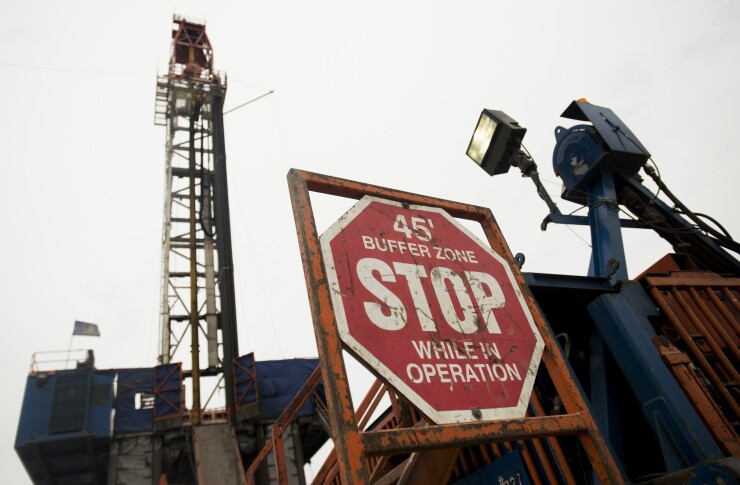Pennsylvania Gov. Tom Wolf's new wrinkle to his oft-repeated call for a
Whether Democrat Wolf, elected to a second term in November, can get it past the Republican-controlled legislature this time is a big question.

"A severance tax to finance infrastructure is probably a good idea," said Alan Schankel, a managing director at Janney Capital Markets in Philadelphia.
"I think tying it to infrastructure is a plus, though he may have trouble getting it past Republicans," Schankel added.
Wolf said the initiative would fund such measures as flood control and anti-blight.
The GOP has repeatedly pushed back on the tax, though lawmakers did pass an "impact fee" under Wolf's predecessor, Republican Tom Corbett.
Wolf last week proposed a 4.5% severance tax on Marcellus Shale gas extraction. According to think tank Commonwealth Foundation, this would lead to roughly $8 billion in debt payments over 30 years.
David Fiorenza, a professor at Villanova School of Business, said debate will follow geographic lines.
"The new severance tax will have legs in the eastern part of the state but west of Harrisburg it will lay dormant," Fiorenza said. Shale activity is heavier in western Pennsylvania.
Wolf bypassed the shale tax in his $34.1 billion budget speech Tuesday at the State Capitol in Harrisburg. While separate from the spending plan itself, it figures to be a central debate point during the session. The fiscal year starts July 1, though Pennsylvania is frequently late.
The budget itself contains no increases in broad-based taxes such as those on income and property, boosts basic education spending and calls for workforce development initiatives.
Pennsylvania’s 14 state universities stand to receive an extra $7 million, though state-related universities — Temple, Lincoln, Penn State and the University of Pittsburgh, which are categorized differently — remain flat.
"I would have liked to have seen an increase for all the colleges," Schankel said.
Wolf also wants a $45,000 minimum salary for public school teachers. According to Schankel, that could strain budgets in poorer school districts.
Unfunded pension liability, deficits and late budgets have triggered rating-agency downgrades over the past three years.
Moody’s Investors Service rates Pennsylvania's general obligation bonds Aa3 with a stable outlook. S&P Global Ratings and Fitch Ratings assign A-plus and AA-minus ratings, respectively. Their respective outlooks are stable and negative.

In election year 2018, the governor and the legislature enacted the first on-time budget since Wolf took office in January 2015. "Democrats and Republicans will interact only if it is in their best interest to get re-elected," Fiorenza said.
Shale tax aside, Republicans struck an agreeable note.
"There is a lot we can embrace and get behind, at least generically," said Senate Majority Leader Jake Corman, R-Bellefonte, citing workforce development in particular.
While Wolf cited Amazon's rejection of Pennsylvania in his budget speech, Fiorenza said the state is better off in the long run without the Fortune 500 company. Amazon triggered a nationwide frenzy with its search for an additional headquarters, entertaining bids from cities before choosing New York and Crystal City, Virginia, in November.
"I am happy Pennsylvania did not get Amazon," he said. "The state does not need to continue its corporate welfare to corporations that place burdens and crowd out small business."
Fiorenza favors a slight increase in the minimum wage. Wolf proposed increasing it to $12 per hour.
"Let the markets of supply and demand determine what wages should be," he said. "Very few businesses in our two major cities [Philadelphia and Pittsburgh] are paying minimum wage to attract workers."





